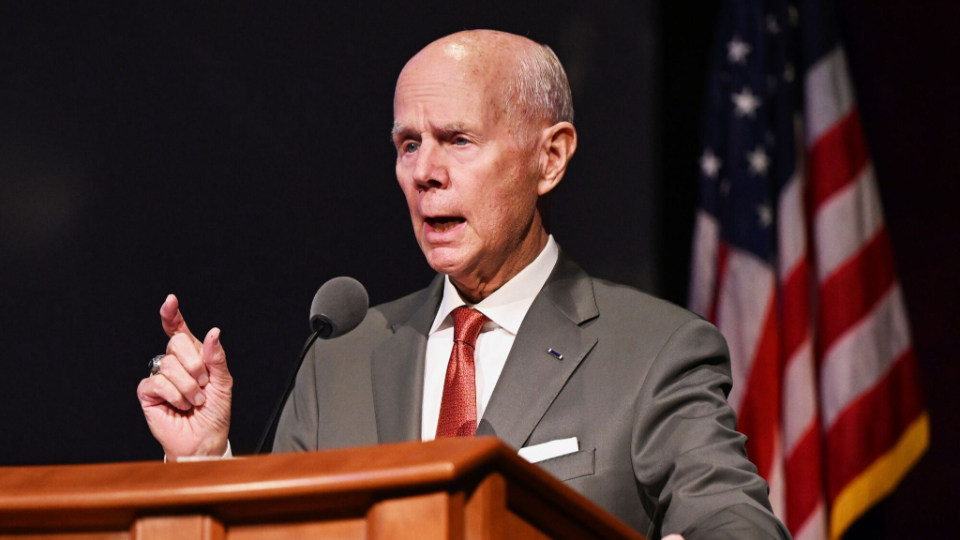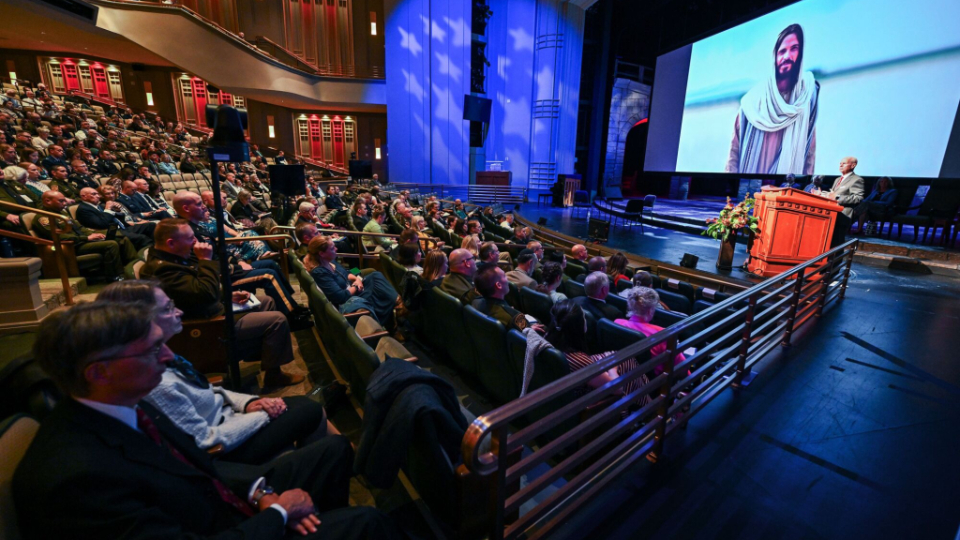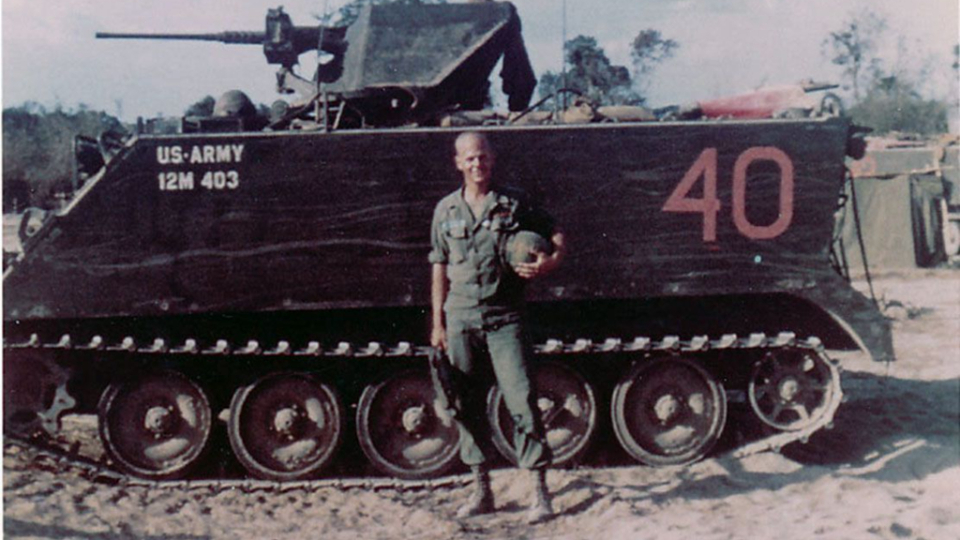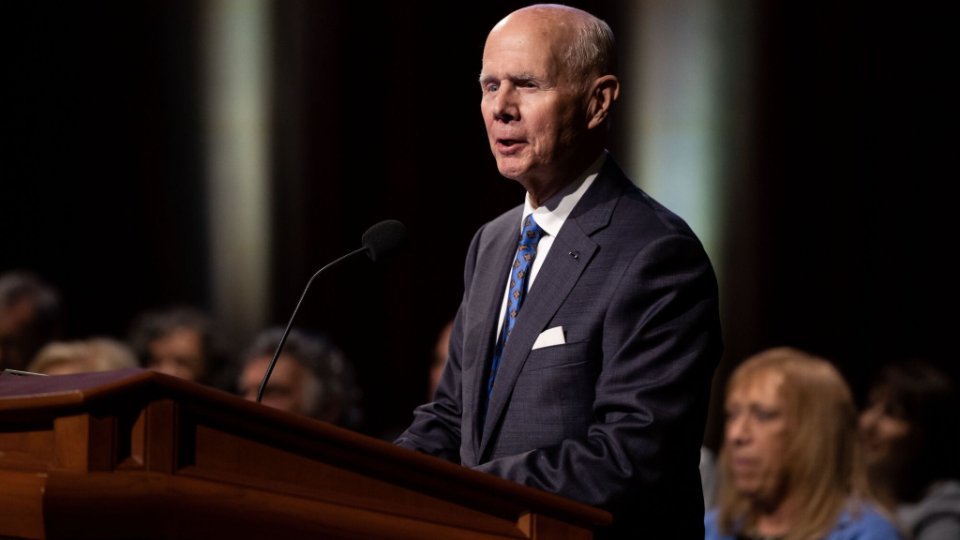
Chaplain-Training-Seminar
Elder Lance B. Wickman, an emeritus General Authority Seventy who served in the Army in Vietnam, speaks at the 2023 Chaplain Training Seminar in the Conference Center Theater in Salt Lake City on Tuesday, October 3, 2023. Photo by Scott G Winterton, courtesy of Church News.Copyright 2023 Deseret News Publishing Company.This story appears here courtesy of TheChurchNews.com. It is not for use by other media.
By Trent Toone, Church News
For infantry soldiers in Vietnam, like then-Capt. Lance B. Wickman, medevac helicopter pilots were the ultimate heroes.
“Quite literally, they were angels, who would drop from the sky in our hours of desperate need — angels with rotary wings. No matter how desperate the battle, no matter how severe the danger, they would come. No mission was too difficult. Even today it is difficult for me to speak of them without tears welling in my eyes. ... In my esteem, they were the greatest heroes among us,” he said. “These airborne angels are emblematic of the message I would like to share today.”
Speaking to hundreds of Church-endorsed chaplains and their spouses, Elder Wickman, an Emeritus General Authority and military veteran, likened the service of chaplains to medevac pilots who flew their “fragile, unarmed helicopters wherever needed, even seemingly into hell itself, to lift a badly wounded soldier to safety and medical care.”
Said Elder Wickman, “Your commission ... is to seek after the spiritual, emotionally and mentally wounded wherever they are, to embrace them and to help them find solace.”
Elder Wickman delivered his message as one of several featured speakers at the Chaplain Training Seminar of The Church of Jesus Christ of Latter-day Saints in the Conference Center Theater on October 3.
Who Is Elder Wickman?
Elder Wickman is an Emeritus General Authority who has served as Church general counsel. He was called to the Second Quorum of the Seventy in 1994 and later served in the First Quorum of the Seventy from 2000 to 2010.
Elder Wickman was a captain in the United States Army from 1964 to 1969. The former Army Ranger served two tours of duty in Vietnam as an infantry platoon leader and as a military adviser to the Army of the Republic of Vietnam, receiving the Bronze Star and Purple Heart medals, the Valorous Unit Citation and the Combat Infantryman’s Badge.
He graduated from the University of California, Berkeley, and received his Juris Doctorate from Stanford University. He practiced law as a trial lawyer and partner in the international law firm of Latham & Watkins in Los Angeles and San Diego, California.
Elder Wickman served in the Church’s Central British Mission from 1961 to 1963. Prior to his call as a General aAuthority, he was a bishop, stake president and regional representative.

Chaplain-Training-Seminar
Elder Lance B. Wickman, an emeritus General Authority who served in the Army in Vietnam, speaks at the 2023 Chaplain Training Seminar in the Conference Center Theater in Salt Lake City on Tuesday, October 3, 2023. Photo by Scott G Winterton, courtesy of Church News.Copyright 2023 Deseret News Publishing Company.‘Men of Faith and Goodness’
Elder Wickman told about some of the soldiers he served with in Vietnam — “men of faith and goodness” — whose lives still inspire him.
Pvt. James Washington, a grenadier in his platoon who survived being bitten by a deadly poisonous snake, always carried a small copy of the New Testament in his uniform as a promise to his mother. During combat, a piece of shrapnel lodged in the little book of scripture.
“Washington showed me that Bible with the jagged piece of steel protruding from it,” Elder Wickman said. “‘Washington,’ I said, ‘You save that Bible and show it to your grandchildren. Show them how being true to your mother saved your life.’”
Another soldier, Danny Fernandez, sacrificed his life by jumping on a grenade to save four comrades. He was later awarded the Medal of Honor.
Sgt. Laie Fonoimoana, a platoon squad leader, was a faithful elder of the Church. Each night he knelt beside his foxhole to pray. Eventually, without invitation or urging, his men all joined him. His foxhole became a gathering place for a small band of soldiers in their stressful hour, Elder Wickman said.
First Sgt. Samuel K. Solomon Jr. was another devout Latter-day Saint who Elder Wickman said resembled artist Arnold Friberg’s muscular depiction of Captain Moroni. He kept his Book of Mormon on display at his desk in the barracks.
Solomon served in the Korean War and did not need to deploy to Vietnam, but he would not stay behind while his troops were in harm’s way. During combat on June 26, 1966, he braved enemy fire to carry severely wounded men to safety. While carrying the last of his men out, he was killed.
“These were some of the inspiring men I knew,” Elder Wickman said. “Men who brought their faith with them. Men who just by being who they were strengthened all around them.”

Chaplain-Training-Seminar
Capt. Lance B. Wickman stands in front of a tank. Elder Wickman, now an Emeritus General Authority Seventy, served in the Army from 1964 to 1969. He completed two tours of duty in Vietnam as an Army Ranger officer. Photo courtesy of Saints at War Collection, L. Tom Perry Special Collections, BYU; courtesy of Church News.All rights reserved.Go to the ‘Wounded’
Many years following Elder Wickman’s military service, he was serving as a stake president in the San Diego area when the Marine Corps Recruitment Depot was assigned to his stake. The Church was limited in how it could minister to the Marine recruits, but a small branch was established.
Elder Wickman attended branch meetings often and said he wanted two things for each recruit upon his graduation: first, to be a great Marine, and second, to be an ordained elder.
The last Sunday before their graduation from basic training, the recruits had become Marines — and so many were newly ordained elders.
“I concluded ... the Lord loved basic training,” Elder Wickman said.
Like those medevac choppers, chaplains must go where the “wounded” are to serve their flock. “Seldom is that going to be in your office, or even the base chapel,” he said. “Wherever it is, be there.”
‘No Less Serviceable’
In the Book of Mormon’s 48th chapter of Alma, the prophet Mormon describes the impressive attributes of Captain Moroni before writing that Helaman and his brethren were “no less serviceable.” Elder David A. Bednar of the Quorum of the Twelve Apostles highlighted the phrase as part of his October general conference message, “In the Path of Their Duty.”
The phrase reminded Elder Wickman of chaplains.
“I thought of the consecrated service you are rendering to our country. I thought of the consecrated service you are rendering to the Lord,” he said. “Your contributions are no less serviceable than the greatest captains we have among us.”

Chaplain-Training-Seminar
Elder Lance B. Wickman, general counsel of The Church of Jesus Christ of Latter-day Saints, speaks at an event presenting Robert Abrams with the Thomas L. Kane Award in the Conference Center Theater in Salt Lake City on Thursday, June 9, 2022. Photo by Spenser Heaps, courtesy of Church News.Copyright 2023 Deseret News Publishing Company.Duty, Honor, Country, Priesthood
In a 1962 address at West Point, New York, Gen. Douglas MacArthur coined a phrase: “Duty, honor, country.”
“Those three hallowed words reverently dictate what you ought to be, what you can be, what you will be. They are your rallying points: to build courage when courage seems to fail, to regain faith when there seems to be little cause for faith, to create hope when hope becomes forlorn,” MacArthur said.
Elder Wickman added one more word: “Priesthood.”
“With that addition, the general’s phrase perfectly captures each here today, men and women, brothers and sisters,” he said. “For each is here today, not only as a commissioned officer, but as one, who has likewise been commissioned by the priesthood of God to your great service.”

